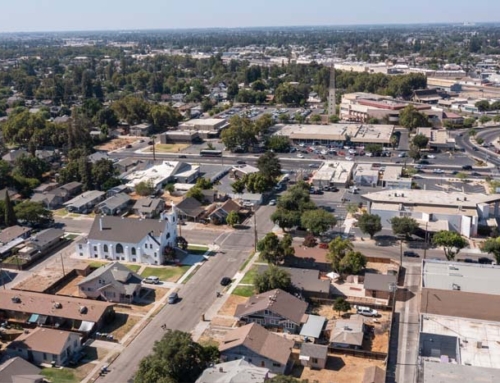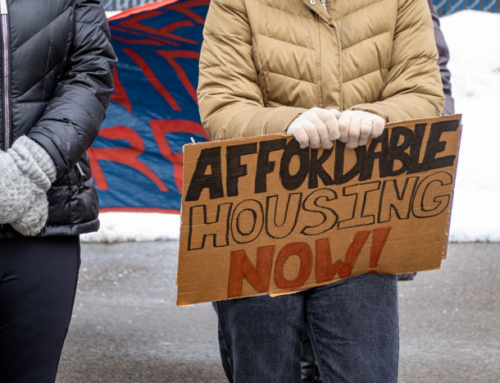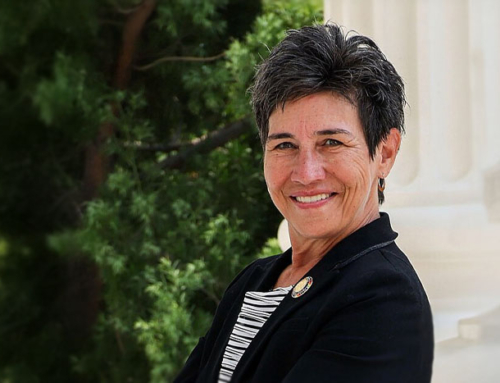The 2023-2024 Supreme Court term will feature two key cases highlighting tensions in the public discourse regarding housing and homelessness, particularly in California. The first, Sheetz v. County of El Dorado, California, concerns development impact fees, which fund local services and could impact costs of development and the development process; the second, City of Grants Pass, Oregon, v. Johnson, could grant California cities more clarity around enacting ordinances to sweep homeless encampments and further criminalize homelessness. The Court is expected to issue decisions by the end of June.
On January 9, the Supreme Court heard the case of George Sheetz, who applied for a permit to place a manufactured house on his land in El Dorado County and was required to pay a $23,420 traffic mitigation fee to do so. Sheetz is challenging the fee’s constitutionality, arguing that the fee violates the Fifth Amendment’s takings clause, which is intended to uphold the principle that the government should not single out isolated individuals to bear excessive burdens, even in support of an important public good.
Sheetz argues that contrary to a four-decade-old Supreme Court precedent, the county had failed to prove that the fee accurately reflected the impact that his project would leave on local roads, while the County is countering that officials have done the legally required due diligence to justify the fee and even if this were not the case, fees passed by local elected bodies that apply equally to all applicants, as opposed to one-off fees levied on specific developments, do not warrant such close judicial scrutiny.
Such fees, also considered “impact fees,” are development fees that are increasingly used to support local services. While impact fees are a normal part of doing business for developers around the country, California’s fees are particularly high: as of 2015, the average impact fee on a single-family home in California was more than quadruple other states’, holding property values constant, and can substantially increase the cost of development. California’s high fees are partly driven by a lack of other local revenue sources for public infrastructure.
The outcome of this case could have multiple repercussions on housing development and local government. A ruling that the fee is equivalent to the seizing of private property could call into question the constitutionality of other fees, tolls, and requirements, including local inclusionary zoning requirements. Requiring a closer property-specific analysis prior to imposing fees could impact local funding sources, slow down the development process, and strain local government resources.
The Supreme Court additionally agreed in January to hear a second case, City of Grants Pass, Oregon, v. Johnson, that could grant cities more power to sweep homeless encampments. Oral arguments will be presented before the Supreme Court in April. The question before the Supreme Court is whether enforcing “generally applicable laws regulating camping on public property” constitutes “cruel and unusual punishment” prohibited by the Eighth Amendment. A ruling in favor of Grants Pass could result in the overturning or narrowing of a 2018 precedent from a federal appeals court, Martin v Boise, that ruled that it was cruel and unusual punishment to criminalize camping on public property when the campers have nowhere else they can legally sleep.
This case is particularly controversial. Multiple amicus briefs, legal briefs submitted by parties not directly involved but that often take one side of the case, have been filed for this case, including statements from Governor Newsom, the California State Association of Counties, the California State Sheriffs’ Association, district attorneys for Sacramento and San Diego Counties, and the Cities of Los Angeles and San Francisco. Advocates for the unhoused plan on filing amicus briefs in the coming months. Localities seek “clarity and guidance” on whether they can set restrictions on the definition of “adequate shelter” and the times or locations where camping is allowed. Meanwhile, advocates for the unhoused are concerned that a ruling in favor of Grants Pass could make homelessness worse, as criminalizing homelessness could further impact unhoused persons’ ability to obtain shelter and jobs. Sweeps without shelter could additionally push people experiencing homelessness from location to location.
Whatever the decision, its repercussions are likely to be felt for years to come. Governments, advocates, and other stakeholders will have to continually adapt to the changing judicial landscape and seize opportunities to house the most vulnerable.
© LeSar Holdings/LeSar Development Consultants. All Rights Reserved. Please be advised that any republishing of copyrighted material provided by our organization, in whole or in part, requires prior written authorization. For permission, please reach out to [email protected]. We appreciate your understanding and compliance in upholding copyright laws.






















